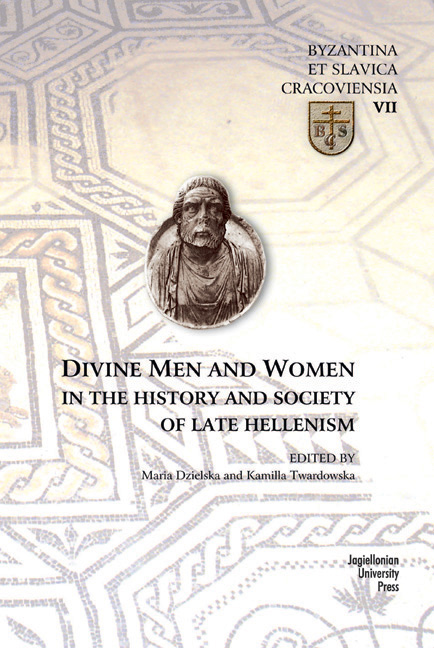Book contents
- Frontmatter
- Contents
- Foreword
- Introduction
- List of participants
- The Divine Man of Late Hellenism: A Sociable and Popular Figure
- Praying, Wonder-Making and Advertising: The Epitynchanoi's Funerary Inscriptions
- Philosophy and Culture as Means to Divine Ascent in Late Antiquity: The Case of Synesius
- Once More on Hypatia's Death
- Boethius — Divine Man or Christian Philospopher?
- Aspects of Divinization According to Farīd-al-dīn ʿAṭṭār Nīšāpūrī (died c. 1221)
- Lecture Halls at Kom el-Dikka in Alexandria
- Salustios — Divine Man of Cynicism in Late Antiquity
- Sosipatra — Role Models for ‘Divine’ Women in Late Antiquity
- Athenais Eudocia — Divine or Christian Woman?
- Damascius' Isidore: Collective Biography and a Perfectly Imperfect Philosophical Exemplar
- Conference photo gallery
Sosipatra — Role Models for ‘Divine’ Women in Late Antiquity
Published online by Cambridge University Press: 05 December 2014
- Frontmatter
- Contents
- Foreword
- Introduction
- List of participants
- The Divine Man of Late Hellenism: A Sociable and Popular Figure
- Praying, Wonder-Making and Advertising: The Epitynchanoi's Funerary Inscriptions
- Philosophy and Culture as Means to Divine Ascent in Late Antiquity: The Case of Synesius
- Once More on Hypatia's Death
- Boethius — Divine Man or Christian Philospopher?
- Aspects of Divinization According to Farīd-al-dīn ʿAṭṭār Nīšāpūrī (died c. 1221)
- Lecture Halls at Kom el-Dikka in Alexandria
- Salustios — Divine Man of Cynicism in Late Antiquity
- Sosipatra — Role Models for ‘Divine’ Women in Late Antiquity
- Athenais Eudocia — Divine or Christian Woman?
- Damascius' Isidore: Collective Biography and a Perfectly Imperfect Philosophical Exemplar
- Conference photo gallery
Summary
1. Introduction
In the research of the last twenty years, a paradigm shift in the study and perception of Late Antiquity can be sensed, from an epoch of decay and anxiety to an epoch of transformation, crucial in shaping later European civilizations. But in all these varying pictures one motif remains constant: the sense that in Late Antiquity there was a special keenness for religion, for the interaction with the divine world. The collection of biographical anecdotes of philosophers and rhetoricians of the 4th century assembled by Eunapios of Sardes can be viewed as a typical product of late antique paganism: for the highest bios, the philosophical life, a special connection with the divine is a must. Whether viewed by Praechter or Geffcken as an instance of the irrational wonder-craving bend of late Greek religion, or by Penella or Cox Miller as a means of circumscribing Eunapios' notion of true Hellenism, the Lives are of special interest as they provide us not with stories about legendary ancient philosophers, but with salient examples of what a 4th century cultivated pagan considered to be ‘divine’ humans among his contemporaries.
Eunapios' collection of figures embodying Hellenism features one female philosopher, Sosipatra, the wife of Eustathios. Her biography is inserted into that of her husband, which in turn forms part of the life of Aidesios, presented by Eunapios as Iamblichos' successor.
- Type
- Chapter
- Information
- Publisher: Jagiellonian University PressPrint publication year: 2013



